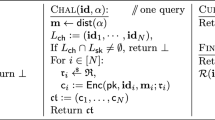Abstract
Chosen-ciphertext security has been well-accepted as a standard security notion for public key encryption. But in a multi-user surrounding, it may not be sufficient, since the adversary may corrupt some users to get the random coins as well as the plaintexts used to generate ciphertexts. The attack is named “selective opening attack”. We study how to achieve full-fledged chosen-ciphertext security in selective opening setting directly from the DDH assumption. Our construction is free of chameleon hashing, since tags are created for encryptions in a flexible way to serve the security proof.
Access this chapter
Tax calculation will be finalised at checkout
Purchases are for personal use only
Preview
Unable to display preview. Download preview PDF.
Similar content being viewed by others
References
Canetti, R., Feige, U., Goldreich, O., Naor, M.: Adaptively Secure Multi-Party Computation. In: STOC 1996, pp. 639–648. ACM, New York (1996)
Bellare, M., Yilek, S.: Encryption Schemes Secure under Selective Opening Attack. Cryptology ePrint Archive: Report 2009/101 (2009)
Bellare, M., Hofheinz, D., Yilek, S.: Possibility and Impossibility Results for Encryption and Commitment Secure under Selective Opening. In: Joux, A. (ed.) EUROCRYPT 2009. LNCS, vol. 5479, pp. 1–35. Springer, Heidelberg (2009)
Hofheinz, D.: Possibility and Impossibility Results for Selective Decommitments. Cryptology ePrint Archive, Report 2008/168, http://eprint.iacr.org/2008/168
Hemenway, B., Libert, B., Ostrovsky, R., Vergnaud, D.: Lossy Encryption: Constructions from General Assumptions and Efficient Selective Opening Chosen-Ciphertext Security. In: Lee, D.H. (ed.) ASIACRYPT 2011. LNCS, vol. 7073, pp. 70–88. Springer, Heidelberg (2011)
Boldyreva, A., Fehr, S., O’Neill, A.: On Notions of Security for Deterministic Encryption, and Efficient Constructions without Random Oracles. In: Wagner, D. (ed.) CRYPTO 2008. LNCS, vol. 5157, pp. 335–359. Springer, Heidelberg (2008)
MacKenzie, P.D., Reiter, M.K., Yang, K.: Alternatives to Non-malleability: Definitions, Constructions, and Applications. In: Naor, M. (ed.) TCC 2004. LNCS, vol. 2951, pp. 171–190. Springer, Heidelberg (2004)
Zhang, R.: Tweaking TBE/IBE to PKE Transforms with Chameleon Hash Functions. In: Katz, J., Yung, M. (eds.) ACNS 2007. LNCS, vol. 4521, pp. 323–339. Springer, Heidelberg (2007)
Boyen, X., Waters, B.: Shrinking the Keys of Discrete-Log-Type Lossy Trapdoor Functions. In: Zhou, J., Yung, M. (eds.) ACNS 2010. LNCS, vol. 6123, pp. 35–52. Springer, Heidelberg (2010)
Damgård, I., Jurik, M.: A Generalisation, A Simplification and Some Applications of Paillier’s Probabilistic Public-Key System. In: Kim, K.-C. (ed.) PKC 2001. LNCS, vol. 1992, pp. 119–136. Springer, Heidelberg (2001)
Freeman, D.M., Goldreich, O., Kiltz, E., Rosen, A., Segev, G.: More Constructions of Lossy and Correlation-Secure Trapdoor Functions. In: Nguyen, P.Q., Pointcheval, D. (eds.) PKC 2010. LNCS, vol. 6056, pp. 279–295. Springer, Heidelberg (2010)
Kiltz, E.: Chosen-Ciphertext Security from Tag-Based Encryption. In: Halevi, S., Rabin, T. (eds.) TCC 2006. LNCS, vol. 3876, pp. 581–600. Springer, Heidelberg (2006)
Cash, D., Kiltz, E., Shoup, V.: The Twin Diffie-Hellman Problem and Applications. In: Smart, N.P. (ed.) EUROCRYPT 2008. LNCS, vol. 4965, pp. 127–145. Springer, Heidelberg (2008)
Fehr, S., Hofheinz, D., Kiltz, E., Wee, H.: Encryption Schemes Secure against Chosen-Ciphertext Selective Opening Attacks. In: Gilbert, H. (ed.) EUROCRYPT 2010. LNCS, vol. 6110, pp. 381–402. Springer, Heidelberg (2010)
Bellare, M., Dowsley, R., Waters, B., Yilek, S.: Standard Security Does Not Imply Security Against Selective-Opening. In: Pointcheval, D., Johansson, T. (eds.) EUROCRYPT 2012. LNCS, vol. 7237, pp. 645–662. Springer, Heidelberg (2012)
Böhl, F., Hofheinz, D., Kraschewski, D.: On Definitions of Selective Opening Security. In: Fischlin, M., Buchmann, J., Manulis, M. (eds.) PKC 2012. LNCS, vol. 7293, pp. 522–539. Springer, Heidelberg (2012)
Hemenway, B., Ostrovsky, R.: Lossy Trapdoor Functions from Smooth Homomorphic Hash Proof Systems. In: Electronic Colloquium on Computational Complexity (ECCC 2009), p. 127 (2009)
Hemenway, B., Ostrovsky, R.: Homomorphic Encryption Over Cyclic Groups Implies Chosen-Ciphertext Security. Cryptology ePrint Archive, Report 2010/099 (2010)
Hofheinz, D.: All-But-Many Lossy Trapdoor Functions. In: Pointcheval, D., Johansson, T. (eds.) EUROCRYPT 2012. LNCS, vol. 7237, pp. 209–227. Springer, Heidelberg (2012)
Kiltz, E., Mohassel, P., O’Neill, A.: Adaptive Trapdoor Functions and Chosen-Ciphertext Security. In: Gilbert, H. (ed.) EUROCRYPT 2010. LNCS, vol. 6110, pp. 673–692. Springer, Heidelberg (2010)
Krawczyk, H., Rabin, T.: Chameleon Signatures. In: NDSS 2000, pp.143-154. The Internet Society (2000)
Lai, J., Deng, R.H., Liu, S.: Chameleon All-But-One TDFs and Their Application to Chosen-Ciphertext Security. In: Catalano, D., Fazio, N., Gennaro, R., Nicolosi, A. (eds.) PKC 2011. LNCS, vol. 6571, pp. 228–245. Springer, Heidelberg (2011)
Mohassel, P.: One-time Signatures and Chameleon Hash Functions. In: Biryukov, A., Gong, G., Stinson, D.R. (eds.) SAC 2010. LNCS, vol. 6544, pp. 302–319. Springer, Heidelberg (2011)
Peikert, C., Waters, B.: Lossy Trapdoor Functions and Their Applications. SIAM J. Comput. 40(6), 1803–1844 (2011)
Rosen, A., Segev, G.: Chosen-Ciphertext Security via Correlated Products. In: Reingold, O. (ed.) TCC 2009. LNCS, vol. 5444, pp. 419–436. Springer, Heidelberg (2009)
Shamir, A., Tauman, Y.: Improved Online/Offline Signature Schemes. In: Kilian, J. (ed.) CRYPTO 2001. LNCS, vol. 2139, pp. 355–367. Springer, Heidelberg (2001)
Author information
Authors and Affiliations
Editor information
Editors and Affiliations
Rights and permissions
Copyright information
© 2012 Springer-Verlag Berlin Heidelberg
About this paper
Cite this paper
Liu, S., Zhang, F., Chen, K. (2012). Selective Opening Chosen Ciphertext Security Directly from the DDH Assumption. In: Xu, L., Bertino, E., Mu, Y. (eds) Network and System Security. NSS 2012. Lecture Notes in Computer Science, vol 7645. Springer, Berlin, Heidelberg. https://doi.org/10.1007/978-3-642-34601-9_8
Download citation
DOI: https://doi.org/10.1007/978-3-642-34601-9_8
Publisher Name: Springer, Berlin, Heidelberg
Print ISBN: 978-3-642-34600-2
Online ISBN: 978-3-642-34601-9
eBook Packages: Computer ScienceComputer Science (R0)




